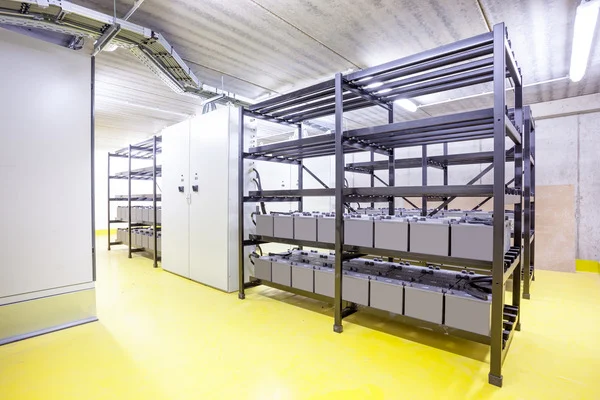UPS Short Time Backup Battery: A Critical Solution for Data Center Power Resilience
In mission-critical environments like data centers, even a few seconds of power interruption can result in massive data loss, system downtime, or equipment damage. While many facilities focus on long-duration power backup, short-time backup batteries within uninterruptible power supply (UPS) systems offer a specialized and highly effective solution. This article explores what a UPS short time backup battery is, why it’s particularly essential for data centers, and how to select the right battery technology for high-reliability infrastructure.
What Is a UPS Short Time Backup Battery?
A UPS short time backup battery is designed to provide immediate but limited-duration power—typically between 30 seconds to 15 minutes—during a power outage. Rather than supporting full facility operations for extended periods, it ensures uninterrupted function for just long enough to:
-
Initiate generator systems
-
Complete automated shutdown sequences
-
Prevent equipment failure and data corruption
-
Enable seamless failover to alternate power sources
This brief but critical buffer is essential in fast-paced environments like data centers, where milliseconds matter.
Why Data Centers Rely on Short-Time Backup Solutions
Unlike industrial or residential applications that might need hours of backup, data centers are highly structured environments with precise failover protocols. In most modern facilities:
-
Backup generators take over within 5–10 seconds
-
Power switching systems activate almost instantly
-
Redundant infrastructure minimizes full-system backup requirements
Thus, the primary role of the UPS is not to sustain the entire load, but to bridge the gap between power loss and generator availability with 100% reliability.
Core Battery Technologies for Short-Time UPS Applications
1. Valve-Regulated Lead-Acid (VRLA) Batteries
-
Discharge Capability: High current output over short durations
-
Pros: Low cost, widely available
-
Cons: Bulky, heat-sensitive, shorter cycle life (~400 cycles), higher maintenance
-
Use Cases: Legacy data centers, budget-constrained facilities
2. Lithium Iron Phosphate (LiFePO₄) Batteries
-
Discharge Capability: Excellent performance under high-load conditions
-
Cycle Life: ~3000 full cycles
-
Thermal Stability: Superior safety for controlled server environments
-
Footprint: Smaller size, lighter weight
-
Pros: Zero maintenance, fast recharge, compact form factor
-
Cons: Higher upfront cost, but significantly lower total cost of ownership
-
Use Cases: Tier 2/3/4 data centers, high-density server racks, edge data centers
🔧 Data center operators increasingly choose LiFePO₄ batteries for UPS short backup due to their reliability under high power demands, minimal maintenance, and superior thermal management.
Design Considerations for Data Center Applications
When designing or upgrading UPS systems for short-duration use, data center engineers and facility managers must evaluate:
| Parameter | Consideration |
|---|---|
| Discharge Rate | Can the battery support high surge current typical in server rooms? |
| Runtime | Is 3–7 minutes of support sufficient for failover or safe shutdown? |
| Power Density | Rack space is premium; high energy density batteries are preferable. |
| Heat Output | Minimize thermal strain in controlled environments. |
| Integration | Compatibility with modern UPS infrastructure and power monitoring systems. |
| Safety & Certification | UL, CE, and local regulatory compliance are crucial in enterprise facilities. |
Advantages of LiFePO₄ Batteries for Data Centers
| Feature | Impact in Data Center Environments |
|---|---|
| High Cycle Life | 3000+ cycles minimize replacement frequency |
| Compact Size | Saves rack space in dense server configurations |
| No Maintenance | Ideal for remote or co-located facilities with minimal staff |
| Stable Chemistry | Low thermal runaway risk in temperature-sensitive rooms |
| Fast Recharge | Reduces system vulnerability between outages |
Future Trends in Short-Time UPS for Data Centers
As demand for edge computing and hyperscale facilities rises, short-duration backup systems are evolving:
-
Modular UPS architectures with lithium integration
-
AI-based battery monitoring for predictive maintenance
-
High-voltage DC systems using lithium battery strings
-
Environmentally sustainable solutions with longer life cycles and reduced waste
Investing in future-ready short-time UPS batteries helps minimize downtime, lower operational risk, and extend infrastructure ROI.
Conclusion
In high-performance data centers, UPS short time backup batteries serve a precise and mission-critical role: ensuring continuity until secondary systems engage. As traditional lead-acid batteries show their limitations, LiFePO₄ lithium batteries emerge as the preferred choice due to their safety, efficiency, and space-saving advantages.
Whether you’re planning a new facility or upgrading an aging UPS system, understanding the value of short-duration lithium backup can make the difference between seamless failover and costly disruption.


